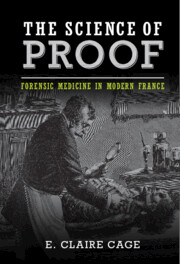Book contents
- The Science of Proof
- Studies in Legal History
- The Science of Proof
- Copyright page
- Contents
- Figures
- Acknowledgments
- Introduction
- 1 The Science of Death
- 2 Poisoning and the Problem of Proof
- 3 Deception and Detection
- 4 Reproductive Bodies and Crimes
- 5 The Forensics of Sexual Crimes against Children
- Conclusion and Epilogue
- Notes
- Bibliography
- Index
4 - Reproductive Bodies and Crimes
Published online by Cambridge University Press: 25 August 2022
- The Science of Proof
- Studies in Legal History
- The Science of Proof
- Copyright page
- Contents
- Figures
- Acknowledgments
- Introduction
- 1 The Science of Death
- 2 Poisoning and the Problem of Proof
- 3 Deception and Detection
- 4 Reproductive Bodies and Crimes
- 5 The Forensics of Sexual Crimes against Children
- Conclusion and Epilogue
- Notes
- Bibliography
- Index
Summary
Male medical experts faced challenges and uncertainty in examining presumably pregnant or postpartum women, particularly condemned women facing execution who declared pregnancy, as well as women accused of infanticide. Forensic doctors’ efforts and methods to establish the facts of infanticide cases commonly elicited criticism from other medical men or judicial authorities, and their conclusions were frequently at odds with the accused’s version of events. In many cases, forensic reports and testimony appeared to be the most decisive factor in shaping jury verdicts. However, all-male juries often weighed forensic evidence against evaluations of the character and life circumstances of the accused, and the sympathies of jurors shaped the interpretation of forensic evidence as well as judicial verdicts. Medical men’s role in the search for material proof of the crime was often both crucial and problematic, and changing, ambivalent social attitudes towards infanticide shaped the interpretations and consideration of forensic evidence.
- Type
- Chapter
- Information
- The Science of ProofForensic Medicine in Modern France, pp. 110 - 141Publisher: Cambridge University PressPrint publication year: 2022

